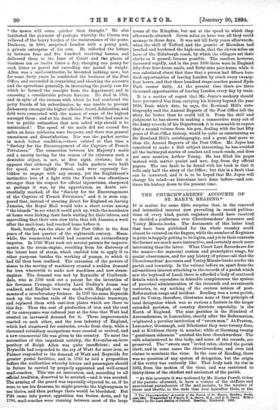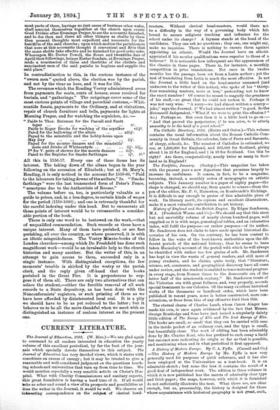THE CHURCHWARDENS' ACCOUNTS OF ST. MARY'S, READING.*
IT is matter for some little surprise that, in the renewed and intensified interest now prevailing in record publica- tions of every kind, parish registers should have received so decided a preference over Churchwardens' Accounts and Vestry Minute-books. The documents of this latter kind that have been published for the whole country could almost be counted on the fingers, while the number of Registers in print is happily getting to be legion, and yet in their contents the former are much more instructive, and certainly much more interesting than the latter. What Court Leet Records are for the manor—for manorial custom and prescriptive usage, for quaint observances, and for any history of prices—all that the Churchwardens' Accounts and Vestry Minute-books arefor the parish and township. In the volume before us, apart from the adventitious interest attaching to the records of a parish which saw the boyhood of Laud, there is afforded a body of scattered details which reproduce in tolerable completeness the system of parochial administration of the sixteenth and seventeenth centuries, to say nothing of the curious notices of post- Reformation usage and incident. Reading was a town parish, and its Vestry, therefore, illustrates none of that principle of local delegation which was so curious a feature in the larger extended parishes, of country districts especially, in the North of England. The nine parishes in the Hundred of .A.mounderness, in Lancashire, shortly after the Reformation, originated a peculiar institution of "sworn men." At Preston, Lancaster, Goosnargh, and Ribchester they were twenty-four, and at Kirkham thirty in number, while at Garstang twenty "gentlemen sidesmen " assisted the four churchwardens. The oath administered to this body, and some of the records, are preserved. The "sworn men" levied rates, elected the parish clerk, and in some cases the churchwardens, and even laid claims to nominate the vicar. In the case of Reading, there was no question of any system of delegation, but the origin of the vestry was curiously like. That body took its rise in 1603, from the motion of the vicar, and was restricted to thirty-three of the chiefest and ancientest of the parish.
"At this aecounte it was motioned by Mr. Docter Powell, vichar of the parishe aforesaid, to have a vestere of the chiffeste and anneientest parisehonere of the said pariahs, to the number of three and thertie, to the ends that ever hereafter theie, or the • The Churchwardens* Accounts of the Parish of St. Mary's, Reading, Berke, 14849.1562. Transeribed by Francis N. A. Garry, MA., and A. G. Garry. With a. Preface by the Lord Bishop of Oxford. Reading Blackwell. 1893. most parts of them, havinge no just cause of business other wales, shall associat themselves togeather at the church upon everie Good Fridaie after Evenings Prayer, to see the accountte fmisshed, and to doe then and there all other thinges as shalbe by them then present thoughte most expedient and necessarie for the beniffitte of the said churche ; upon which motion the parishioners that were at this accountte thought it convenient and ffitte that the same sholde take effeotte and be fmisshed for good order sake. Whereupon Mr. Docter Powell, the ffoure and twentithe dale of A/will then followings, beings Easter Sundaie, at Evenings Prayer, made a nominacion of three and thertithe of the chefiste and annciantest men of the said pariahs to beginne and supplie the said place."
In contradistinction to this, in the curious instance of the "sworn men" quoted above, the election was by the parish, and not by the vicar as here, and it was for life.
The revenues which the Reading Vestry administered arose from payments for seats, rents of houses, sums received for burials, and "gatherings." The outgoings cover some of the most curious points of village and parochial customs,—Whit- suntide feasts, payments to the Ordinary, and at visitations, repair of church furniture and bells, payments for lights at Morning Prayer, and for watching the sepulchre, Sze. :— Paide to Thos. Bateman for the Paecall and ffantt Paide to Roger Brocke for washing of the sepulker viijd.
Paled for the hallowing of the altars xiiiis. Payed to the minstrills and the hobby-horse upon May Day
Payed for the mourys dangers and the minstrills'
mete and drinke at Whitsuntyde iijs. iiijd.
Pd for V. peirs of showes for the morris dansers iiijs. Paled to the Register for Smoke farthinges ijs.
All this in 1556-57. Every one of these items has its interest. The taking down of the altars began in the year following on the accession of Elizabeth; but at St. Mary's, Reading, it is only noticed in the account for 1559-60, "Paid to the labourers for taking downe of the aultars," 2s. "Smoke farthings" were the last transmuted form of Peter's Pence, " sometyme due to the Anthecriste of Roome."
The volume before us, too, is particularly valuable as a
guide to prices, and, in a less degree, to certain kinds of wages for the period (1550.1660); and one is extremely thankful for the careful indexing under this head. But to enumerate all these points of interest would be to retranscribe a consider- able portion of the book.
There is only one word to be beatowed on the work,—that of unqualified commendation. Such records as these have a unique interest. Many of them have perished, or are fast perishing, all over the country, or where preserved, it is with an idiotic misguidedness. The Vestry Minute-books of the London churches—among which Dr. Freshfield has done such magnificent work—would be an invalaable help to the church historian and many another. But the writer of this, in an attempt to gain access to them, succeeded only in a single instance. With distinguished exceptions, the few moments' trouble is shirked by the vestry or the parish clerk, and the reply given off-hand that the books perished in the Great Fire. It is preposterous to sup- pose it of them all. There are only two alternatives that can solace the student,—either the forcible removal of all such records to a State depository, as has been done with the Nonconformists' registers, or such printing of them as we have here afforded by disinterested local zeal. It is a pity we should have to be as yet reduced to the latter ; but it behoves us to be all the more thankful when we meet with so distinguished an instance of zealous interest as the present one.



































 Previous page
Previous page